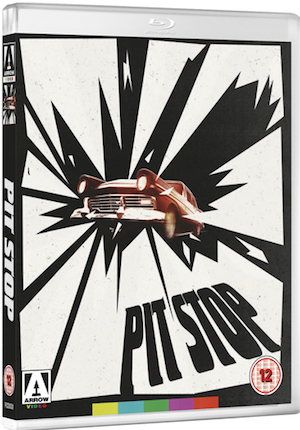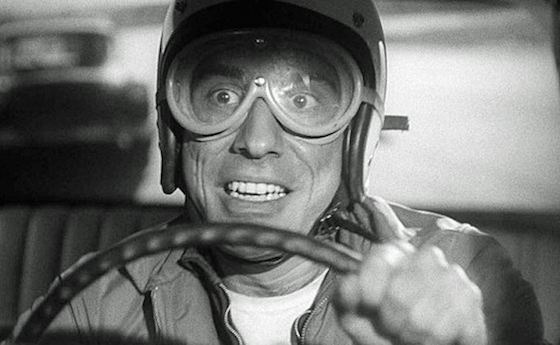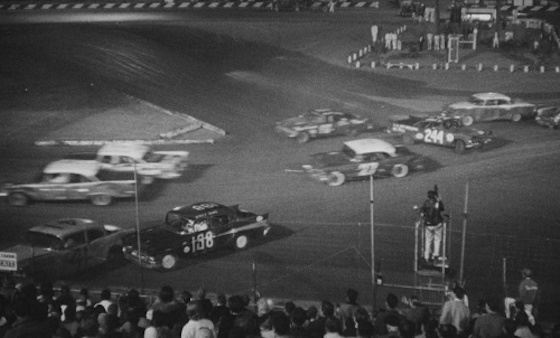Watching Jack Hill‘s 1969’s dirt-track destruction flick, Pit Stop (out now on a dual-format Blu-ray/DVD from Arrow Video), it’s remarkable to see just how tight it is. So much of cult or grindhouse fare is padded with chatter, it becomes the sort of thing to which one’s accustomed. This means that, when a film manages to cut the dialogue down and up the action, a film manages to break free from the pack and take the lead simply by virtue of being more like a “real movie.”
The plot’s simple: Rick Bowman (Richard Davalos) starts out as a bad-ass hot rodder, is recruited by backer Grant Willard (Brian Donlevy) and gradually moves from the dirt-track figure-eight races to the modifieds to actual stock car racing. Along the way, things get dark, and he hurts people on his way to the top. Nothing fancy, but it keeps things taut and there’s no wasted moments with expository dialogue.
Case in point: Bowman tells the owner of a junkyard that he’ll pay for his car out of his race winnings, but if he loses, he’ll work for the guy at $2 an hour to pay it off. He loses the race, and the next scene sees him with an acetylene torch in the same junkyard. Easy-peasy – no discussion, just cut to the inevitable action.
And, really, it’s the action that really moves Pit Stop along. It’s 60-70% footage of actual car racing, and while the shots of the grandstand don’t exactly reveal the crowd going as wild as the announcer says they are, the races see plenty of crash and bash, giving yet another edge to the whole affair. Seriously: you’re never quite sure whether or not someone might be getting hurt.
Given that some of the characters are a little wild, a little cocky, and somewhat flash, you’re almost hoping someone will get their comeuppance. Be it Bowman for his disregard for anyone but himself, Sid Haig‘s Hawk Sidney and his obnoxiousness, or the cold and seemingly uncaring star of Willard’s racing stable, Ed McLeod (George Washburn), you kind of wish that someone’s going to get burned.
It’s refreshing to see characters onscreen that have these negative aspects, especially as they’re balanced out by the occasional glimpse of personal growth as the film goes along. These racers might be a little less than fully-rounded, but they’re certainly not two-dimensional caricatures. By Pit Stop‘s end, you’re actually feeling for these peoples’ collective losses, and that’s far more than one can say for most films of this stripe.
The psychedelic blues soundtrack by the Daily Flash gives the film a certain dirty edge, right from the opening theme backing the street rodding competition which gets Bowman noticed by Willard, all the way through the end credits. There’s no release whatsoever of this music in any sort of official capacity, which seems like an absolute shame. Fans of the the Dave Allan and the Arrows score for The Wild Angels should take note.
The bonus features focus mainly on the memories of those involved in making the film. There are individual interviews with actor Sid Haig, director Jack Hill, and producer Roger Corman. They all offer slightly different takes on the making of Pit Stop, but their stories are all more complimentary than contrasting. A commentary track with Hill goes deeper into the particulars of the movie. An excellent little piece on the restoration of the film, along with the original trailer, rounds out the extras.
While this might be least-known of director Jack Hill’s efforts, even within the pantheon of work he did for Corman’s New World Pictures, it’s definitely worth a closer look. Hill describes the picture at one point as a racing film where the guy wins the big race, but loses his soul. An art-house stock-car flick from the director of Spider Baby and Foxy Brown should be enough to light the interest of any self-respecting cult film fan.








Comments on this entry are closed.